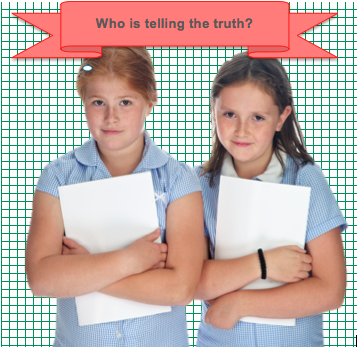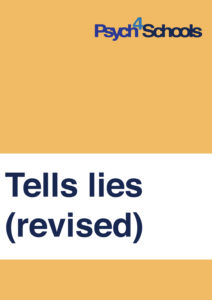
Who is telling the truth?
May 14, 2017
It is not unusual for children to sometimes tell lies or embellish the truth, particularly in the preschool and early primary years. One of the most vexatious behaviour management situations for teachers relates to getting to the bottom of a conflict between children, where none of the protagonists will admit to being at fault, there are no witnesses, and it appears that one or more of the children involved are not telling the truth. All parties claim they are innocent, not involved or that they didn’t do it. It can be difficult for the teacher to know who is telling the truth.
When there is no evidence and two different stories the following strategies may help:
- Insist that the child responsible for the unacceptable behaviour or lie owns up immediately. Clearly state the consequences for lying, separate from the consequences for the unacceptable act. Having additional consequences reinforces that lying is not acceptable.
- Ask that both children promise to tell the truth. This can increase the likelihood of truth telling in children, particularly those in the junior years.[1] Lyon, T., Malloy, L., Quas, J.A., Talwar, V. (2009). Coaching, truth induction, and young maltreated children’s false allegations and false … Continue reading
- Ask each child to write (or the teacher can transcribe) the ‘opposing’ accounts. Once the written stories have been completed, continue the discussion with both parties. Recounting events verbally and comparing the two written accounts can help to identify inaccuracies, prompting honesty from the untruthful child.
- If two children insist they are telling the truth and the truth cannot be fully established, tell each child that their behaviour will be monitored. Provide the same consequence for both children. It may be effective to ask each child what they believe the consequence should be for both and have them come to an agreement. This often leads to one child owning up to the negative behaviour.
- When there is no evidence and two different stories
- If the child has a disability or additional needs
- Whole school strategies
- Lesson plans and activities
See our newly released Working with children who lie (revised) ebooklet. Available online to Psych4Schools members here.
Not a member? Join today, or read an extract of the ebooklet here or purchase the ebooklet here.
Not a member? Join today, or read an extract of the ebooklet here or purchase the ebooklet here.
References
